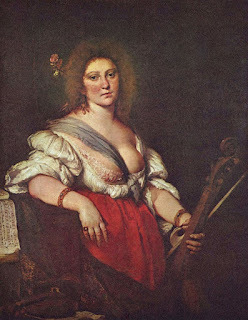"Barbara Strozzi: The Illegitimate Diva of Venice

During the 17thcentury, in the magical city of Venice, a little girl named Barbara Strozzicame into the world. She had quite the mysterious birth, with her mother knownonly as “La Greghetta.” Talk about a secret identity! Barbara was baptized inthe church of Santa Sofia, and while her birth certificate didn’t spill thebeans on her father’s identity, rumor has it that he might have been GiulioStrozzi, a poet and librettist who had quite the influence inseventeenth-century Venice.
Now, Giulio wasa big shot in the literary world. He was a member of the prestigious Accademiadegli Incogniti, which was like the Avengers of intellectuals back then. Theywere a force to be reckoned with in the Republic of Venice and beyond. Giuliodabbled in all kinds of writing, from poetry to operas, prose to plays, andeven lyrics for songs. He was basically the Renaissance version of amulti-hyphenate superstar.
As for Barbara’smother, not much is known about her. Historians suspect her name was Isabella,and she might have been a servant of Giulio. Barbara and Isabella lived underthe same roof and were even mentioned in Giulio’s will. So, it seems like theywere one big happy (and slightly unconventional) family.
Now, here’swhere things get interesting. Despite being an illegitimate child, Barbara hada unique relationship with her “adoptive father” Giulio. He saw her potentialand helped her carve out a career as a musician later in life. Talk about asupportive dad! Barbara grew up in a household that was a hotspot for literaryand musical geniuses of the time. Imagine having a front-row seat to all thecreative magic happening around you. It must have been like living in aRenaissance version of MTV Cribs.
As Barbaraentered her teenage years, Venice was hit by plague after plague, and it seemedlike everyone was dropping like flies. But Barbara and her mother managed tosurvive. Clearly, they had some serious survival skills. By the age of twelve,Barbara had already started showing off her musical talents. She had a voicethat could move mountains, and she could even accompany herself on instrumentslike the lute or theorbo.
Barbara’smusical gifts became more apparent as she grew older, and Giulio decided totake things up a notch. He arranged lessons in composition for her with noneother than Francesco Cavalli, one of the hottest composers in town. By the timeshe hit fifteen, Barbara was hailed as “la virtuosissima cantatrice di GiulioStrozzi” (Giulio Strozzi’s extremely virtuosic singer). I bet her business cardwas the size of a billboard to fit that title.
Giulio wasn’tone to keep Barbara’s talent under wraps. He started promoting her musicalprowess like a proud stage mom, ensuring that works were dedicated to her leftand right. He even founded the Accademia degli Unisoni, a fancy club formusicians that operated from the Strozzi household. Talk about a privateconcert venue! Barbara got to showcase her singing skills and perform her ownworks in semi-public settings. It was like being a pop star before pop starswere even a thing.
When Barbaraturned 18, she officially adopted her father’s last name, Strozzi, and carriedit with her until her last breath. By her late teens, she had gained quite thereputation for her singing. Two volumes of songs full of praises for her voicewere published, and she was the talk of the town. Well, at least the musicalcircles in Venice.
Now, Barbarahad big dreams, and she sought out patronage to help make them come true. Butlet’s just say she had a few misses along the way. Her opus 2, dedicated toFerdinand III of Austria and Eleanora of Mantua on their marriage, wentunnoticed. Ouch. But hey, she didn’t give up! She dedicated works to othernotable folks like Anne de’ Medici, Nicolò Sagredo (who would later become theDoge of Venice), and Sophia, Duchess of Brunswick and Lüneburg. She evencomposed songs for the Duke of Mantua, proving that persistence pays off.
Barbara Strozziwas a force to be reckoned with in the music scene. She was the most prolificcomposer of secular vocal music in Venice during the seventeenth century. Hercompositions were like catnip for the ears, and she had a knack for poeticlyrics. She was a master at setting texts by the poet Marino, using them as away to express herself and challenge gender norms of the time. She knew how tohit those high notes both musically and metaphorically.
And let’s notforget her opus 5, a rare collection of sacred songs. She dedicated it to theArchduchess of Innsbruck, Anna de Medici. Barbara’s motet “Mater Anna” was likea musical homage to both the Catholic saint and the archduchess herself. It wasa power move, combining spirituality and flattery in one composition. Barbaraknew how to work her musical magic.
So, there youhave it, the extraordinary and witty tale of Barbara Strozzi, the musicalprodigy of Venice. She may have faced challenges and setbacks, but she neverstopped pursuing her passion. Her legacy lives on as a testament to the powerof talent, determination, and a touch of Renaissance charm. Bravo, Barbara!



